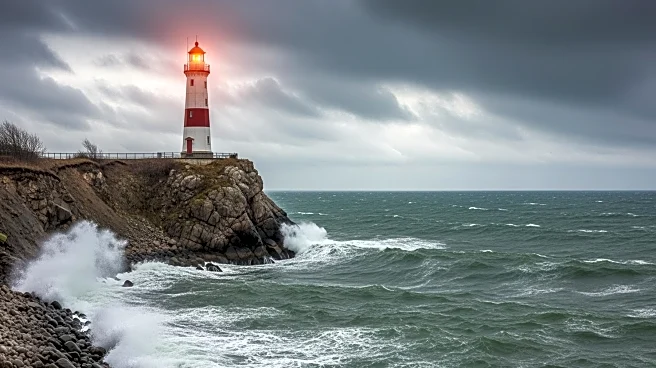What's Happening?
Kaliningrad, a Russian exclave surrounded by NATO countries, is experiencing significant economic challenges due to its isolation from European Union neighbors and logistical complications. The region, strategically important to Moscow, is home to Russia's
Baltic Fleet and Iskander ballistic missiles. Despite the defiance of local residents and officials, the area is struggling with increased costs and limited access to goods. The borders with Poland and Lithuania are virtually closed, and air and train travel to the rest of Russia is heavily restricted. Inflation has surged across Russia, exacerbating the economic difficulties faced by Kaliningrad.
Why It's Important?
The isolation of Kaliningrad highlights the broader geopolitical tensions between Russia and NATO countries, particularly in the context of the ongoing conflict in Ukraine. The economic hardships faced by the region could lead to increased dissatisfaction among residents, potentially affecting local support for Russian policies. Additionally, the strategic importance of Kaliningrad as a military hub underscores the significance of maintaining stability in the area. The situation also reflects the impact of international sanctions and border closures on regional economies, which could have long-term implications for Russia's economic and political strategies.
What's Next?
The future for Kaliningrad remains uncertain as geopolitical tensions persist. The region may continue to face economic challenges unless diplomatic relations improve or logistical solutions are found. The Russian government might need to implement measures to alleviate the economic strain on Kaliningrad's residents, such as subsidies or alternative trade routes. Meanwhile, NATO countries may continue to reinforce their borders and monitor Russian activities closely, potentially leading to further diplomatic confrontations.
Beyond the Headlines
The situation in Kaliningrad raises ethical questions about the impact of geopolitical conflicts on civilian populations. The isolation and economic difficulties faced by residents highlight the human cost of international disputes. Additionally, the reliance on military strength and strategic positioning in the region reflects broader cultural and historical narratives within Russia, emphasizing resilience and defiance against perceived external threats.















